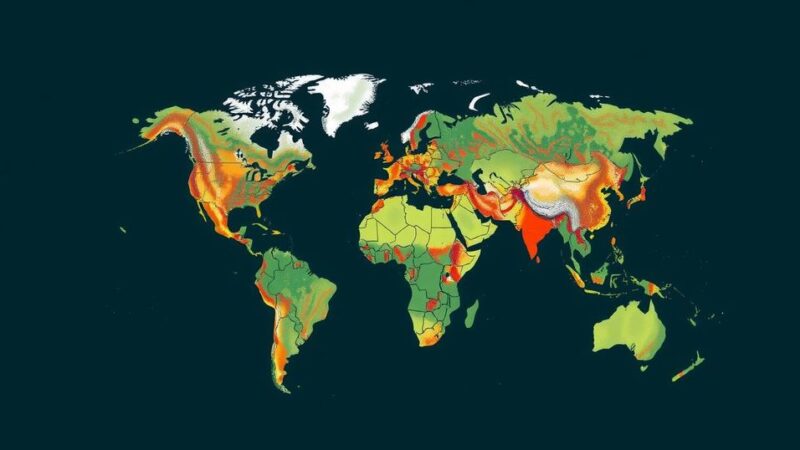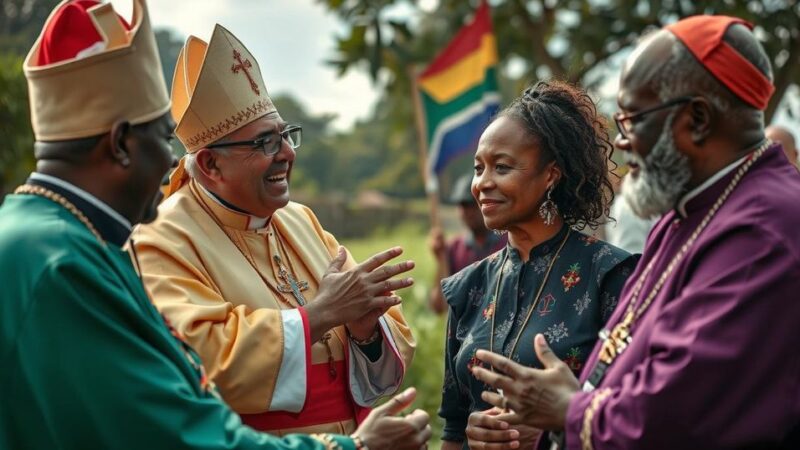On Tuesday, Jim Hurrell and Kenneth Shockley addressed the complexities of climate change interventions at Colorado State University. They explored both scientific approaches, such as aerosol injection and cloud brightening, and the ethical concerns these interventions raise, emphasizing the need for fairness and responsibility in addressing climate change. The event encouraged dialogue on the balance between technological solutions and moral obligations toward future generations.
On Tuesday evening, Jim Hurrell and Kenneth Shockley presented a discussion on the ethics surrounding human-induced atmospheric interventions to address climate change, aimed at a diverse audience of students and faculty. Their talk focused on Colorado State University’s Climate Initiative, emphasizing the collaborative effort among experts to foster a climate-resilient future through educational and research-based endeavors.
Professor Hurrell, an expert in atmospheric science, specifically addressed global temperature increases resulting from climate change. He stressed the necessity for global cooperation to mitigate warming impacts, outlining two primary intervention strategies: enhancing the energy radiated back into space through carbon dioxide removal and increasing Earth’s reflectivity.
Primary methods to achieve increased reflectivity include stratospheric aerosol injection and marine cloud brightening, both of which potentially replicate the natural cooling effects observed during volcanic eruptions. Although localized results have demonstrated effectiveness, Professor Hurrell acknowledged the uncertainties surrounding these interventions. Through predictive models, scientists suggest that atmospheric intervention could play a critical role in averting future temperature increases.
Conversely, Professor Shockley provided a philosophical analysis of the ethical implications inherent in such climate interventions. He raised pertinent moral dilemmas regarding anthropogenic changes to the atmosphere, cautioning that these actions could usher in justice that favors the modifying entities over marginalized populations. The long-term effects and governance of climate interventions warrant careful consideration, as future generations would bear the consequences of current decisions.
Shockley articulated his concerns regarding power disparities, asserting that those with technological capabilities must remain mindful of their impact on vulnerable communities. He expressed apprehension about the potential hubris involved in climate modification, emphasizing that with great power comes great responsibility.
Audience members expressed a range of reactions, highlighting the tension between hope and caution surrounding climate intervention methods. Student attendee Megan Voss noted the critical importance of weighing various factors carefully as society moves forward in addressing climate issues.
The speakers urged a thorough examination of the ethical dimensions tied to climate intervention, reinforcing the idea that while technology may present solutions, it must not overshadow the moral responsibilities we hold towards each other and future generations.
The discussion highlighted significant concerns regarding the implementation of climate intervention technologies as possible solutions for climate change. It underscored the collaborative effort at Colorado State University to integrate expertise in addressing the multifaceted challenges climate change presents. The perspective on ethical ramifications encourages a deeper understanding of the societal implications of climate action, suggesting a need for inclusive deliberation about the rights and responsibilities of those who wield power in environmental decision-making. Through the viewpoints shared by both experts, the conversation reflects the intricacies of climate science, the urgent need for cooperative global action, and the intersection of ethics and environmental technology.
In conclusion, the dialogue led by Professors Hurrell and Shockley at Colorado State University illuminated the scientific and ethical complexities surrounding climate change interventions. While technological advancements hold considerable promise in combating global warming, the discussions emphasized the imperative to consider equity, governance, and moral responsibilities. As society navigates potential solutions to climate challenges, the insights shared highlight the importance of fostering inclusive conversations that account for the diverse impacts on future generations.
Original Source: collegian.com

